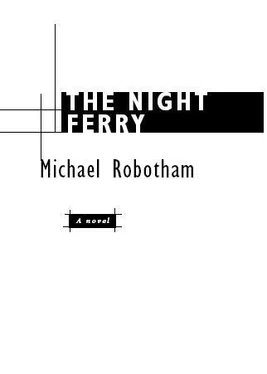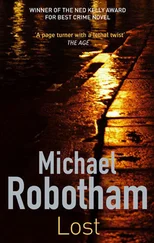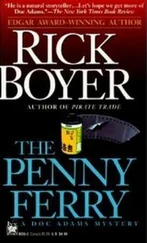“But you will,” he laughs, pointing to the meter.
I give him all my remaining Euros for he still has to get home.
He kisses me three times—left cheek, right cheek and left cheek again.
“Be careful.”
“I will.”
I have an hour until the Stena Britannica leaves. The ship dominates the skyline, towering over the surrounding structures. It is the length of two football fields and the height of a fifteen-story building, with twin stacks that slope backward and give the impression, although not the conviction, of speed.
Seagulls circle and swoop for insects in the beam of the spotlights. They appear so graceful in flight yet they squabble like fishwives on the ground. And they always sound so desperately sad, wailing in misery like creatures already condemned to hell.
Many trucks and trailers are already on board. I can see them lined up on the open decks, a few feet apart, buttressed hard against the stern railings. More trucks are queuing on the loading ramp. Meanwhile cars and vans are being marshaled in a different parking area, waiting their turn.
A young woman in the ticket office wears a light blue skirt and matching jacket, like a maritime stewardess. “You will need to write down the details of your vehicle,” she says.
“I don’t have a vehicle.”
“I’m sorry but there is no pedestrian footbridge on this service. We cannot board foot passengers.”
“But I have to catch this ferry.”
“That is not possible.” She glances over my shoulder. “Perhaps…?”
An elderly couple has just pulled up in an early-model Range Rover towing an old-fashioned caravan that looks like a Cinderella pumpkin carriage. The driver is bald with a small goatee that could be a shaving oversight. His wife is twice his size, wearing acres of denim across her hips. They look Welsh and sound Welsh.
“What is it, pet?” she asks, as I interrupt their cup of thermos tea.
“They won’t let me onto the ferry as a foot passenger. I really need to get back to England. I was wondering if I could ride with you.”
Husband and wife look at each other.
“Are you a terrorist?” he asks.
“No.”
“Are you carrying drugs?”
“No.”
“Do you vote Tory?”
“No.”
“Are you a Catholic?”
“No.”
He winks at his wife. “Clear on all counts.”
“Welcome aboard,” she announces, thrusting out her hand. “I’m Bridget Jones. Not the fat one from the movies—the fatter one from Cardiff. This is Bryce, my husband.”
The Range Rover is packed to the gunwales with suitcases, shopping bags and duty-free: Dutch cheeses, French sausage, two cases of Stella Artois, a bottle of Baileys Irish Cream and assorted souvenirs.
They are very cute. A twee couple, with matching lumbar cushions and traveling mugs. Mr. Jones is wearing driving gloves with cut-off fingers and she has road maps, color-coded in a pocket on the dashboard.
“We’ve been to Poland,” she announces.
“Really?”
“Nobody we know has ever been to Poland. Not even our friends Hettie and Jack from the caravanning club, who think they’ve been everywhere.”
“And to Estonia,” her husband adds. “We’ve done 3,264 miles since we left home on August 28.” He strokes the steering wheel. “She’s managed eighteen mile to the gallon, which is pretty bloody good for an old girl, especially after that bad batch of diesel in Gdansk.”
“Gdansk was very dodgy,” agrees his wife.
“It must be cold to be caravanning.”
“Oh, we don’t mind,” she giggles. “A spouse is better than a hot water bottle.”
Mr. Jones nods. “I get pretty good mileage out of this old girl.”
I don’t know if he’s referring to his wife or still talking about the car.
Ahead of us the traffic is moving. Vehicles pull onto the ramp and disappear inside, maneuvered into marked lanes barely wide enough for their axles. Engines are turned off. The caravan is strapped down. Men in fluorescent vests direct us to the air-lock doors, which lead to stairs and lifts.
“Don’t dawdle, pet,” says Mrs. Jones. “The buffet is included in the price. You want to beat the queue.”
Mr. Jones nods. “They do a fine apple crumble and custard.”
A key card is included with my ticket. It corresponds to a cabin on one of the accommodation decks. Deck 8 has signs asking passengers to be quiet because truck drivers are sleeping. Some of them must have boarded hours ago. How am I going to find Samira?
I don’t bother visiting my cabin. I have no luggage to stow. Instead I study the ship’s floor plan, which is bolted to the wall near an emergency exit. There are four vehicle decks which are restricted to authorized personnel during the voyage. Deck 10 is crew only. It must be the bridge.
The corridors between the cabins are just wide enough for two people to pass. I search them, looking for the familiar or the unfamiliar. This used to be my job when I worked for the Diplomatic Protection Group—looking for small changes, trying to sense the presence of someone in a crowd or notice their absence in the instant of looking. It could be a person who doesn’t belong or who tries too hard to belong or who draws the eye for some other reason.
The ship’s engines have started. I can feel the faint vibrations through my feet and they seem to transfer to my nerve endings.
The buffet is being served in the Globetrotter Restaurant. Most of the passengers seem to be truck drivers, dressed in jeans and T-shirts. Food is piled high on their plates—congealed curries, cottage pie, vegetarian lasagna. Big engines need refueling.
The Dutch drivers are playing cards, while the British drivers smoke and read tabloids. The ferry has slipped its moorings and pulled out into the river. As the shore lights slide past the window, it feels as though the land is moving and not the ferry. England is five hours away.
Hokke was right. This haystack is too big. I could search the ferry for weeks and not find Samira. She could be locked in a truck or in one of the cabins. She might not even be on board. Perhaps de Souza had no intention of letting me find her and was simply getting me out of the Netherlands.
The cavernous vehicle decks are below me. Some are open to the elements while others are enclosed. I have to search them. How? Do I hammer on the side of each truck, calling her name? Will she answer?
If there’s any chance at all that she’s on board, I have to find her. Running along the gangways and up the stairs, I stop people and show them Samira’s photograph. I’m doubling back on myself, lost in a maze. Have I been down this corridor before? Is that the same passenger I asked earlier? Most of them are in their cabins now, lying down to sleep.
I turn another corner and suddenly I feel it. A shiver in the air. It’s an uncanny sensation, as if I’m prescient. Along a long corridor, a figure with his back to me pauses to unlock a cabin door. I see a quarter profile and suddenly flatten myself against a wall. My phantoms are following me.
The ferry shifts and I brace myself. We must have reached open water, or maybe it’s my heart lurching. I am sure it was him . Brendan Pearl. He is here because she is here.
My first reaction is to retreat. I pull back and take a few deep breaths on the stairwell, while contemplating what to do. Taking out my mobile, I check the signal. Nothing. The ferry has moved out of range. I should talk to the captain. He can radio ahead and get a message to Forbes.
A member of the crew is climbing the stairs. Although dressed in dark trousers and a white shirt with epaulettes, he looks too young to be at sea. He has a name tag on his chest. Raoul Jakobson.
Читать дальше












